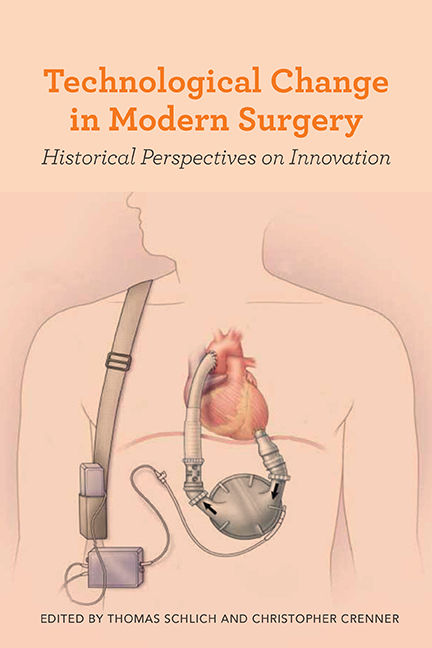Book contents
- Frontmatter
- Dedication
- Contents
- 1 Technological Change in Surgery: An Introductory Essay
- 2 Inimitable Innovation: Johann Friedrich Dieffenbach and the Renewal of Surgery, 1822–1847
- 3 Defining Difference: Competing Forms of Ovarian Surgery in the Nineteenth Century
- 4 “Making Bad Boys Good”: Brain Surgery and the Juvenile Court in Progressive Era America
- 5 Prosthetic Imaginaries: Spinal Surgery and Innovation from the Patient's Perspective
- 6 Disruptive Potential: The “Landmark” REMATCH Trial, Left Ventricular Assist Device (LVAD) Technology, and the Surgical Treatment of Heart Failure in the United States
- 7 Placebos and the Progress of Surgery
- 8 Surgical Practice and the Reconstruction of the Therapeutic Niche: The Case of Myocardial Revascularization
- Bibliography of Secondary Sources
- List of Contributors
- Index
4 - “Making Bad Boys Good”: Brain Surgery and the Juvenile Court in Progressive Era America
Published online by Cambridge University Press: 09 June 2021
- Frontmatter
- Dedication
- Contents
- 1 Technological Change in Surgery: An Introductory Essay
- 2 Inimitable Innovation: Johann Friedrich Dieffenbach and the Renewal of Surgery, 1822–1847
- 3 Defining Difference: Competing Forms of Ovarian Surgery in the Nineteenth Century
- 4 “Making Bad Boys Good”: Brain Surgery and the Juvenile Court in Progressive Era America
- 5 Prosthetic Imaginaries: Spinal Surgery and Innovation from the Patient's Perspective
- 6 Disruptive Potential: The “Landmark” REMATCH Trial, Left Ventricular Assist Device (LVAD) Technology, and the Surgical Treatment of Heart Failure in the United States
- 7 Placebos and the Progress of Surgery
- 8 Surgical Practice and the Reconstruction of the Therapeutic Niche: The Case of Myocardial Revascularization
- Bibliography of Secondary Sources
- List of Contributors
- Index
Summary
At the turn of the twentieth century, an operation purporting to relieve “pressure on the brain” flourished at the unlikely intersection between a newly interventionist branch of surgery and a Progressive Era jurisprudence that was undergoing its own radical transformation. From the 1890s to the 1920s, hundreds of men, women, and children all over the United States were subjected to brain surgery as a means of “curing” “criminal tendencies” that were ascribed to injury-induced temporary changes in the brain. The surgeons were appropriating a new surgical procedure called “decompression,” itself based on older craniotomy techniques, which had recently been developed to alleviate acute intracranial pressure from brain tumors or life-threatening trauma, but was rapidly being applied to an array of other conditions. In a radically different context, the same procedure was reinvented as a “cure” for the misbehavior of children who appeared before juvenile court. To relieve the alleged pressure and remake the social identity of the “delinquent” child, the surgeons permanently removed buttons of bone, or cut long furrows into their patients’ skulls, or resected parts of the membranes that cover the brain. Thus they claimed they could instantly alter, with their scalpels and trephines, the complicated socially contingent human behaviors that society deemed problematic. Both the surgical practice itself and the rhetoric that sustained it draw attention to an unexplored continuity in the history of psychosurgery and demonstrate that lobotomy developed in the 1930s in a context in which the American public had already been exposed for decades to the idea of altering human behavior, thought, and emotion by surgical intervention.
For the surgeons of the Progressive Era, asserting expertise and claiming social relevance in questions of “delinquency” became a means of acquiring cultural and economic capital at a moment when science was conceived as a privileged tool for social and judicial renewal. These were often civically minded surgeons who were interested in Progressive reform, were part of the local elite, and had the eager attention of the Progressive judges they advised. Although Juvenile judges made their recommendation under the guise of parental consent, in making surgery a part of jurisprudence they created a coercive legal environment that mandated the medicalization of children's behavior and its aggressive and dangerous “treatment.”
- Type
- Chapter
- Information
- Technological Change in Modern SurgeryHistorical Perspectives on Innovation, pp. 71 - 99Publisher: Boydell & BrewerPrint publication year: 2017



